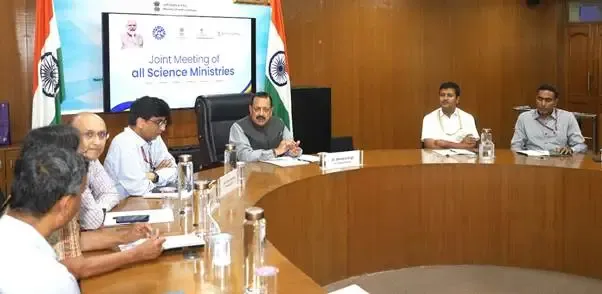How is the Centre Enhancing Security at Technical and Scientific Installations in Border Areas?

Synopsis
Key Takeaways
- Government to enhance security at technical installations in border areas.
- Focus on Jammu and Kashmir, Punjab, and northwest regions.
- IMD installations in Srinagar and Leh will receive special attention.
- Institutions instructed to review security protocols.
- Coordination with local authorities is essential for effective protection.
New Delhi, May 11 (NationPress) The government has declared plans to strengthen security measures at technical and scientific facilities situated in the border regions of Jammu and Kashmir, Punjab, Chandigarh, and northwestern parts of Rajasthan and Gujarat.
Furthermore, crucial IMD installations in Srinagar and Leh will see enhanced security protocols, as stated by Dr. Jitendra Singh, the Union Minister of State (Independent Charge) for Science and Technology.
He led a high-level joint meeting with senior officials and heads of scientific and technical departments to assess the security readiness of technical and scientific installations nationwide, particularly in light of the current security landscape.
The meeting concentrated on evaluating the security preparedness of research and scientific facilities, especially in the border and sensitive areas of Jammu and Kashmir, Punjab, Ladakh, and the northwestern region of India.
Dr. Singh specifically examined the security measures at CSIR-Indian Institute of Integrative Medicine (IIIM) in Jammu; CSIR-Central Scientific Instruments Organisation (CSIO) in Chandigarh; CSIR-Central Leather Research Institute (CLRI) in Jalandhar; CSIR-Institute of Microbial Technology (IMTECH) in Chandigarh; DBT-Biotech Research Innovation Council (BRIC) – National Agri-Food and Biomanufacturing Institute (NABI) in Mohali; Indian Meteorological Department (IMD) installations in Srinagar and other critical regions; as well as Earth Sciences Research Stations in Ladakh and surrounding zones.
Singh highlighted that scientific facilities, particularly those under the Council of Scientific and Industrial Research (CSIR), Department of Biotechnology (DBT), Indian Meteorological Department (IMD), and Ministry of Earth Sciences, form essential pillars of national infrastructure, especially in the areas of weather forecasting, disaster preparedness, and crucial research.
All scientific institutions have been instructed to reassess and enhance their existing security protocols in response to the current situation. They are required to promptly inform the respective district administrations to ensure effective coordination and protection.
Each institution must develop and disseminate Standard Operating Procedures (SOPs) for emergency response, ensuring both staff and local authorities are adequately prepared.
To prevent any disruptions for students and researchers who may have returned to their home states, all upcoming examinations and research proposal calls are to be postponed until further notice. Dr. Singh also instructed the Director General of IMD to immediately strengthen security arrangements at its critical installations and data centers in Srinagar, Leh, and other vital locations.
Dr. Singh underscored the importance of continuous cooperation between scientific institutions and local authorities, stating, “Our scientific institutions are the backbone of national resilience. At this critical juncture, we must ensure they are secure, well-coordinated, and ready for any possible situation.”










